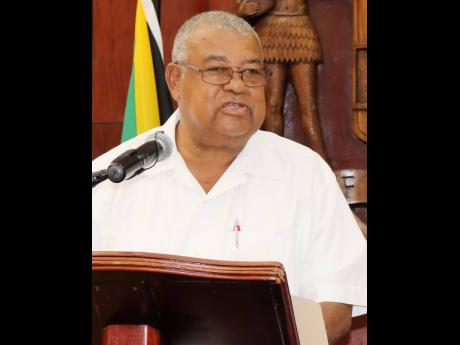Fertiliser demand expected to grow as farmers replant after Beryl
Fertiliser manufacturer Newport-Fersan Jamaica Limited says there should be no shortage of the critical agricultural input for the rest of the year as the sector seeks to recover from nearly $5 billion in losses as a result of Hurricane Beryl.
The Kingston-based company, which says it controls 85 per cent of the local fertiliser market, says farmers should be able to purchase all the supplies they need as they seek to recover from the devastation to the agriculture industry.
“There is no expected shortage of raw material (for the blending of fertiliser) that we can say without a doubt,” said Denton Alvaranga, sales manager at Newport-Fersan. “We have more than three months’ supply of raw material in stock, and that is more than sufficient to meet the national demand for the rest of the year,” Alvaranga said in an interview with the Financial Gleaner.
This should be good news for farmers who were devastated by Category 4 hurricane-force winds of Beryl on July 3.
Last month, Minister of Agriculture, Fisheries and Mining Floyd Green says assessments indicate that the agriculture sector incurred losses totalling $4.73 billion from Beryl’s passage.
He said the assessments indicated that 48,852 farmers were impacted and approximately 23,040 hectares of farmland were affected and that 323,412 animals, including small ruminants, poultry, and cattle, were lost.
Lenworth Fulton, president of the Jamaica Agricultural Society, said the demand for fertiliser is likely to increase when farmers start replanting their crops that were devastated by the hurricane.
In March 2022, fertiliser supplies on the world market were disrupted and prices soared to new highs, following the breakout of the conflict between Russia and Ukraine. Both countries, as well as Belarus, are major suppliers of mineral fertilisers across the world.
Alvaranga explained, however, that Newport-Fersan gets its raw materials from the Americas but said that its prices still rose because of the disruption in the global supply because of the war in Eastern Europe.
“Ukraine and Russia supply a large section of the world’s fertiliser, so if that supply is unavailable, that means supplies in other parts of the world come under additional pressure,” Alvaranga said. In addition, shipping charges increased and shipping times were much longer, the sales manager confirmed.
However, fertiliser prices have been trending down over the past two years.
“What you have seen in the last two years is a reduction in prices.” Alvaranga said, “When the factors that contribute to a price increase are improved, we are happy to roll back the prices, and we have shown that over the past two years.”
Newport-Fersan Jamaica Limited is the Jamaican arm of Fersan, which is headquartered in the Dominican Republic.
The sales manager indicated that the company’s plant, located at Wherry Wharf off Marcus Garvey Drive, was underutilized and can easily meet Jamaica’s demand.
“The capacity of our plant is more than 80,000 metric tonnes per year, and the market size in Jamaica is just over 20,000 metric tonnes of granular fertiliser, which is the main category of fertilisers,” he said.
Commenting on the importance of fertiliser to the agriculture sector at this time, Fulton said the input was needed two weeks after the hurricane when the farmers’ fields dry out and are prepared for replanting.
“Vegetable crops need fertiliser immediately as you replant because you have to give them the boost to develop the roots and the leaves,” Fulton told the Financial Gleaner.
“In terms of bananas, 80 per cent of the trees were destroyed, so firstly, you need to cut back the old banana stalks and allow the new shoots to grow. The fields are sprayed with weedicide and fertiliser applied immediately to boost the new banana suckers,” he said.
The JAS head explained that fertiliser is used throughout the development of banana crops at different stages. “It is used in early stages to boost the young plant and the banana, once it shoots, it takes 13 to 14 weeks to mature, so fertiliser is needed at that time to ensure that the leaves are healthy.”
Fulton said the demand for fertiliser varies during different times of the year and for different parts of the country, depending on the crops being planted and the amount of expected rainfall.
“For example, in the case of Irish potato, the major planting season is between November and January for the Guy’s Hill area where the parishes of St Ann, St Mary, and St Catherine meet. In the case of Manchester, the planting season is March to April. A lot of fertiliser is used during that time,” he said.
“For leafy vegetables, the major planting season is from September through to November in places like McNie, Douglas Castle, and Cave Valley in southern St Ann. Most of these areas are rain-fed, so we have to plant when rain is expected.”
He said the situation was similar in the case of root crops such as yam and sweet potato and permanent crops such as mango in that the fertiliser was needed for healthy leaves for the conversion of sunlight into food.
Last Tuesday, Newport-Fersan handed over 3,000 bags of fertiliser valued at $15.4 million to the Ministry of Agriculture, Fisheries and Mining to assist farmers with their recovery from Hurricane Beryl.
Alvaranga said that although the company exported some fertiliser to countries such as Cuba and Antigua and Barbuda, in general, it was more affordable to export from its parent company in the Dominican Republic.
“We use raw materials which are either mined from the earth or are by-products of the petroleum industry. We do not have deposits of those raw materials here. But the blending of the different fertilisers from the raw materials is done here in Jamaica,” Alvaranga said.


